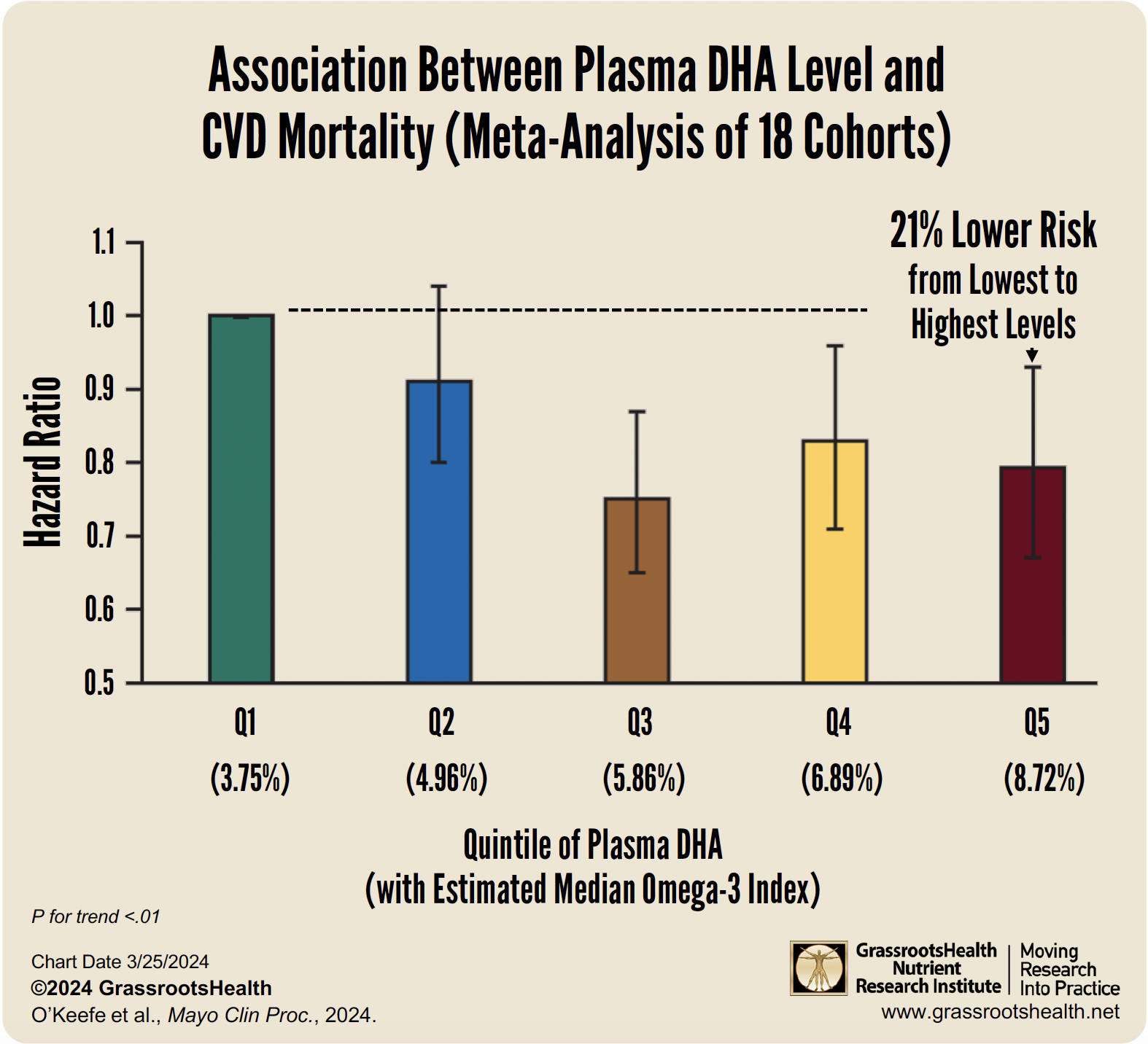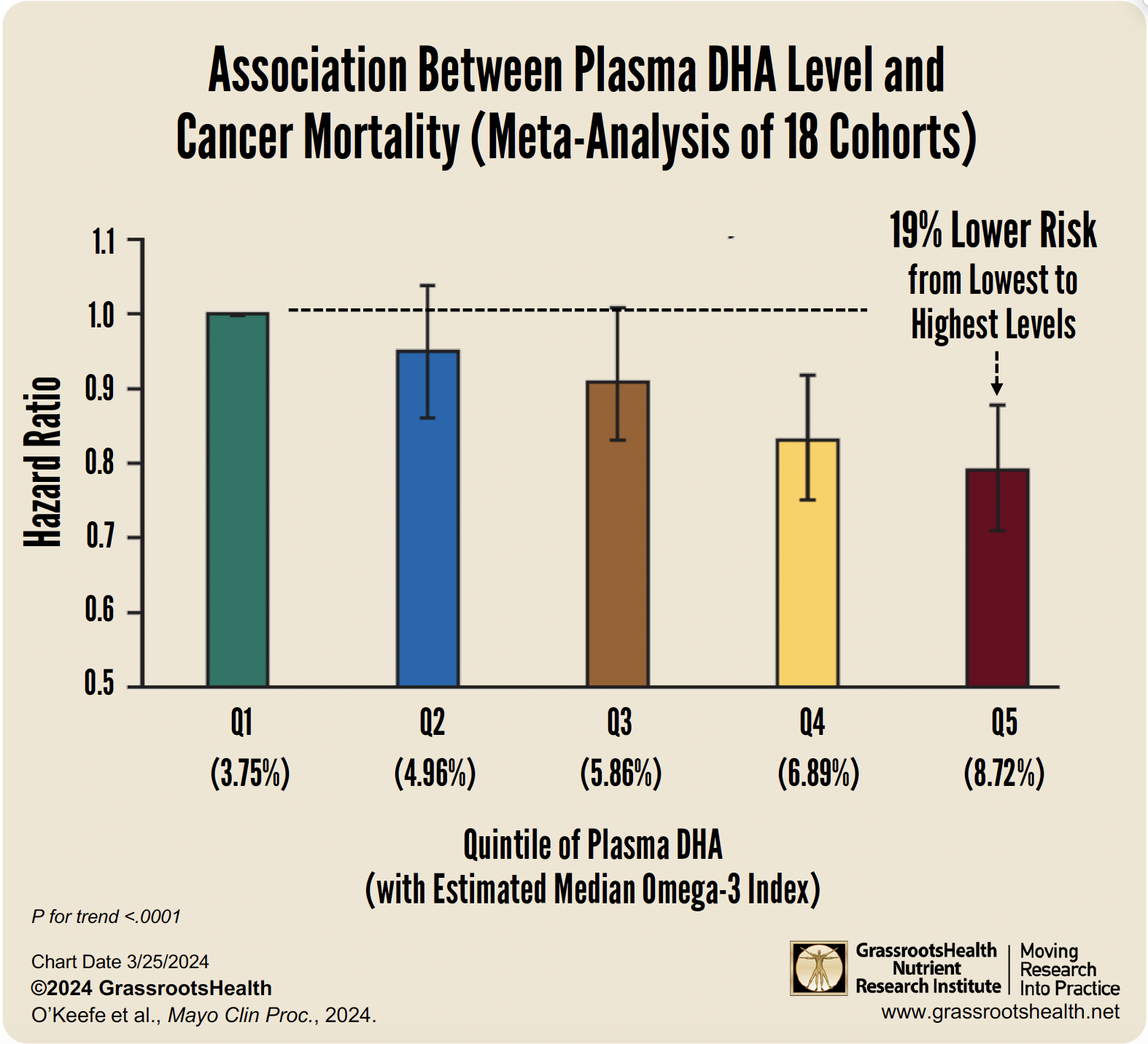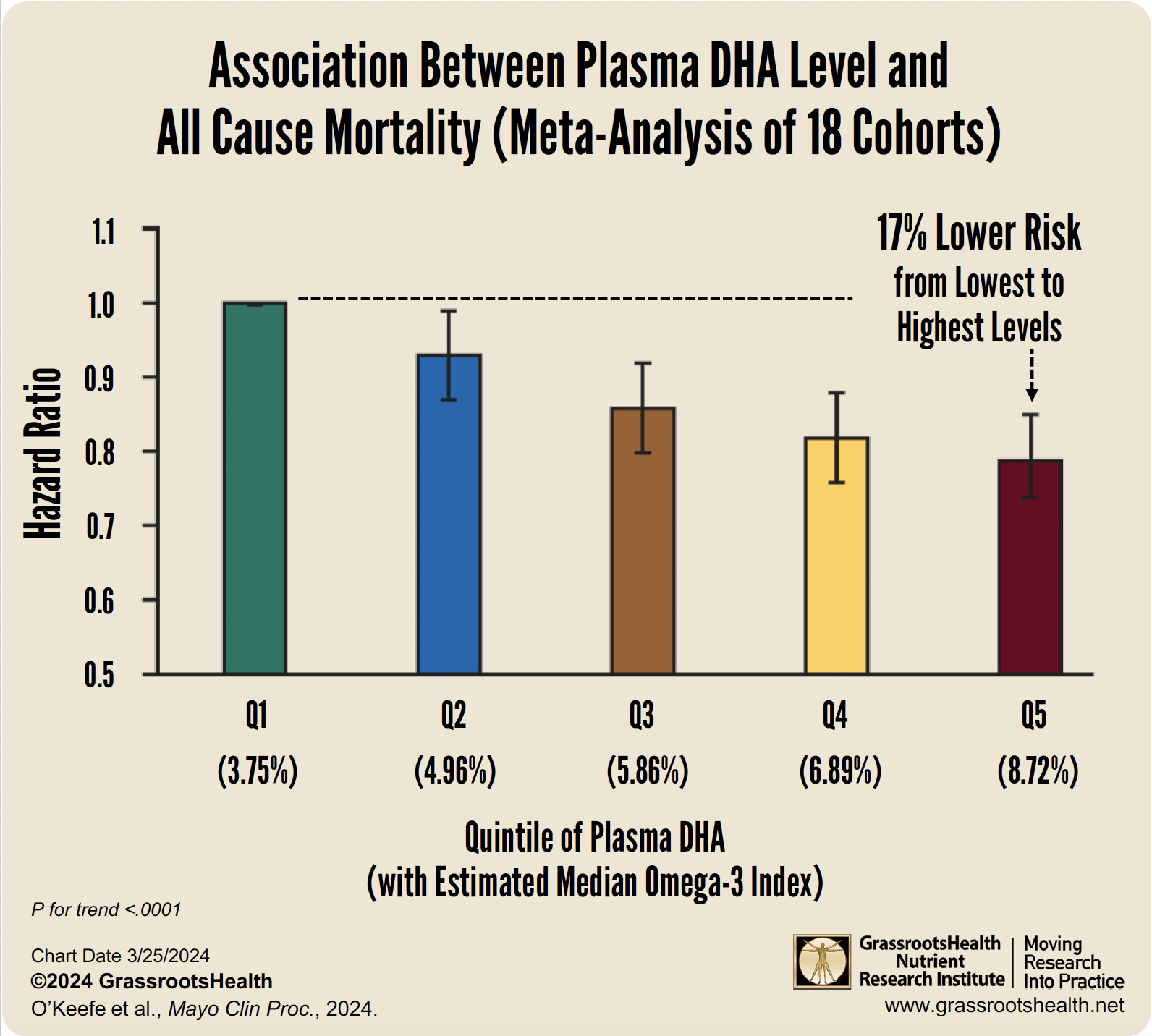New research shows higher levels of docosahexaenoic acid (DHA), an omega-3 fatty acid, were found to be associated with lower risk for overall mortality and deaths caused by cardiovascular disease and cancer
Key Points
- Breaking up the group into quintiles of DHA levels, researchers analyzed association with risk for all-cause mortality and cause-specific mortality, including cardiovascular-related, cancer-related, or other causes of death
- Compared to the lowest quintile, the group with the highest DHA levels had a 21% lower risk of all-cause mortality, as well as cardiovascular-related, cancer-related, and other mortality
- The average American consumes less than one fish or seafood meal per week, in line with the lowest quintile of the group studied; researchers suggest consuming about 1,000 milligrams of DHA+EPA per day is usually needed to achieve and maintain favorable omega-3 blood levels
 WEDNESDAY, March 20, 2024 (KANSAS CITY, Mo. – Saint Luke’s) — Higher levels of docosahexaenoic acid (DHA), an omega-3 fatty acid, were found to be associated with lower risk for overall mortality and deaths caused by cardiovascular disease and cancer, according to a new observational study published in Mayo Clinic Proceedings.
WEDNESDAY, March 20, 2024 (KANSAS CITY, Mo. – Saint Luke’s) — Higher levels of docosahexaenoic acid (DHA), an omega-3 fatty acid, were found to be associated with lower risk for overall mortality and deaths caused by cardiovascular disease and cancer, according to a new observational study published in Mayo Clinic Proceedings.
Researchers analyzed the data of more than 117,000 individuals in the United Kingdom Biobank (UKBB) whose baseline plasma DHA levels were measured and tracked from April 2007 through December 2021.
“A lot of nutritional studies rely on the patients recalling exactly what they ate, which is quite unreliable,” said James O’Keefe, MD, author on the study and director of preventive cardiology at Saint Luke’s Mid America Heart Institute. “This study looked at DHA blood levels, which you can only get through eating fish or seafood or taking an omega-3 supplement.”
Breaking up the group into quintiles of DHA levels, researchers analyzed association with risk for all-cause mortality and cause-specific mortality, including cardiovascular-related, cancer-related, or other causes of death.
Compared to the lowest quintile, the group with the highest DHA levels had a 21% lower risk of all-cause mortality, as well as cardiovascular-related, cancer-related, and other mortality.
In a secondary analysis, researchers added these findings to a previous meta-analysis of about 42,000 individuals that examined the same relationship between DHA levels and mortality. In the combined meta-analysis of more than 160,000 participants followed for 14 years, those in the highest DHA quintile had a 21% lower risk for cardiovascular-related death, 17% lower risk for all-cause mortality, 19% lower risk for cancer-related death, and 15% lower risk for death from all other causes.
“Although these findings do not imply causality, they paint a clear message that high omega-3 levels from diet or omega-3 supplementation correlate with improved life,” Dr. O’Keefe said.
Researchers noted omega-3 consumption has been shown to have many health benefits, including improved cardiovascular and immune function, enhanced cognition, lower blood pressure, slower resting heart rate, and higher vagal tone.
Yet, the average American consumes less than one fish or seafood meal per week, in line with the lowest quintile of the group studied. Researchers suggest consuming about 1,000 milligrams of DHA+EPA per day is usually needed to achieve and maintain favorable omega-3 blood levels. The findings from this new study support the American Heart Association Science Advisory recommendation to consume at least two fish or seafood meals a week.
“This is a safe, simple, low-cost way to change a risk factor for all-cause mortality, as well as cardiovascular mortality, and cancer mortality,” Dr. O’Keefe said.
Read the full article “Circulating Docosahexaenoic Acid and Risk of All-Cause and Cause-Specific Mortality” in Mayo Clinic Proceedings.
Note: 18% of those whose DHA level was in the lowest quintile, 24% of those whose DHA level was in the second quintile, and 30% of those whose DHA level was in the third quintile reported taking fish oil supplements. Each of these groups had an estimated Omega-3 Index below 6% regardless of supplement use.

The Omega-3 Index measures the amount of EPA and DHA in your blood and tissues. Experts recommend a minimum Omega-3 Index of 8% for optimal health – do you know what your Omega-3 Index is? Check yours along with your vitamin D level today as part of the vitamin D*action project, and add the Ratios for more about how to balance your Omega-3s and 6s!
Are You Getting Enough Omega-3s? Check Now with Vitamin D & Other Important Measures!
Measure Your Levels Today
Create your custom home blood spot kit to help determine if you are getting enough of the following nutrients shown to benefit overall health, along with other measures, including:
 Vitamin D
Vitamin D- Omega-3 Index plus AA:EPA Ratio
- Magnesium (plus Zinc, Copper, Selenium, Lead, Cadmium & Mercury)
- hsCRP
- HbA1c
- Type 1 Diabetes Autoantibodies
- TSH
Enroll and test your levels today, learn what steps to take to improve your status of omega-3s, vitamin D and other nutrients and blood markers, and take action! By enrolling in the GrassrootsHealth projects, you are not only contributing valuable information to everyone, you are also gaining knowledge about how you could improve your own health through measuring and tracking your nutrient status, and educating yourself on how to improve it.





 Vitamin D
Vitamin D